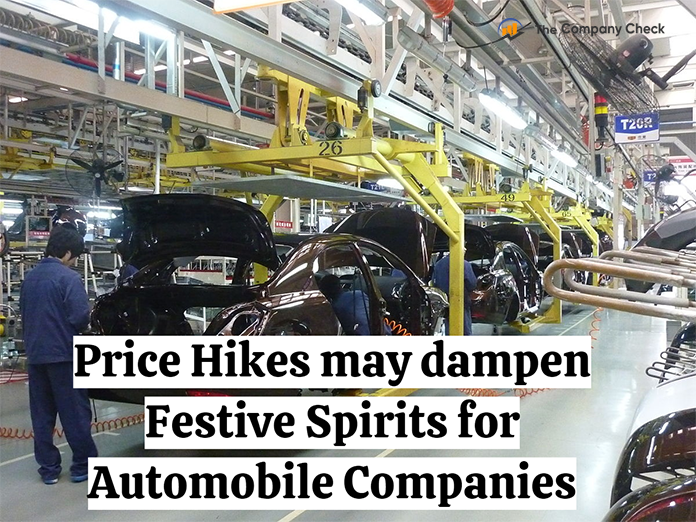Automobile Companies have witnessed a price hike over a couple of months which has led to a simultaneous rise in crude material costs, in this way squeezing the delicate recuperation of operating margins of auto organizations. Prices of steel, aluminum, copper, lead, and rubber have inched up higher in the past month and will add to commodity price pressure for ancillaries. This will adversely impact margins for the auto component industry, investment information and credit rating agency, ICRA, said in a report.
Initial reports from the vendors, passenger vehicle demand has stayed upbeat while two-wheeler demand has stayed subdued during the period, which is considered auspicious. The Federation of Automobile Dealers Association will issue sales information for the whole festival period after Diwali, which falls on November 14.
Price Adjustment
A hike via auto component producers as a rule forces vehicle creators to rearrange their pricing. At the point when demand is at a peak, companies tend to pass on only a part of the hike to the consumers due to fear of hurting demand and competitive pressures. Nonetheless, in a muted demand scenario organizations are compelled to pass on nearly the whole quantum of the price hike to protect their operating margins.
Anuj Khaturia, Chief Operating Officer, Ashok Leyland, said: “There is pressure on the commodity side. Prices of all steel products, flat products, castings, and forgings, have inched up and steel is a major input material.”
Hike Prices of Automobile Companies
Unlisted automobile organizations like Yamaha, Renault, Hyundai, Mercedes-Benz, and BMW and listed organizations like Hero MotoCorp, TVS Motor Company, and Bajaj Auto have increased costs in the last two months. Steel organizations are perceived to negotiating supply contracts for the next six months with auto organizations at better costs, fuelling the chance of a value hike in the immediate future, as well.
Soumen Ray, Chief Financial Officer, Bajaj Auto, said: “We have taken a price hike in the domestic two-wheeler segment in early October. It was between 1.5-2 percent. There is a bit of competitive pressure and we are into the festive season. We do not know to what extent the price hike will offset the raw material price hike because the contracts did not get closed at that time but we will substantially mitigate the impact.”
Bajaj Auto, the nation’s third-biggest two-wheeler dealer in India, clocked a 24 percent increase in homegrown two-wheeler deals during September 2020, making it the second consecutive month of positive growth for the Pune-based organization. During September, the remaining two-wheeler figured out how to grow by 12 percent, according to information shared by the Society of Indian Automobile Manufacturers (SIAM).
Given below is a table showcasing the number of listed and unlisted automobile companies that have witnessed a price hike due to their increased demand
| Unlisted Automobile Companies | Listed Automobile Companies |
| Renault | Hero Moto Corp |
| Yamaha | TVS Motor |
| Hyundai | Bajaj Auto |
| Mercedes Benz |
CV Segment hit hard
The Commercial Vehicle (CV) fragment has been one of the two most worst-hit sections (the other being three-wheeler passenger) since the beginning of April. According to SIAM information, CV sales were 56 percent down during April-September 2020, compared with a similar period a year ago.
Despite the fact that the recuperation popular, particularly for weighty trucks, is exceptionally moderate, it has not halted Chennai-based truck and transport major Ashok Leyland from declaring a price hike. We had increased prices on our products in the first week of October on multi-axle rigid trucks and tippers. It’s quantum varied, depending on the product type, in the range of 1.5-2 percent,” added Khaturia. For the time being, tyre-making companies are not facing as much heat as vehicle and component makers. The price rise of natural rubber is offset by benign crude oil prices and its derivatives. Natural rubber and crude derivatives determine 90 percent of the cost of the tyre.
For more information, visit the website of The Companycheck



